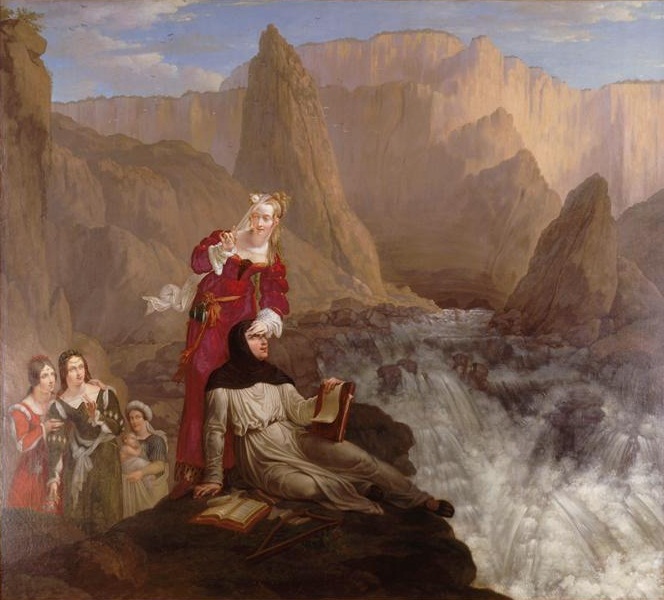Philippe-Jacques van Brée, Laura and Petrarch at Fountaine-de-Vaucluse, 1816
Source: Wikimedia Commons
Source: Wikimedia Commons
In 1337, a year after his ascent of Mont Ventoux, Petrarch travelled to Rome. On his return to Avignon he found that the city's decadence still disgusted him. In his 'Letter to Posterity' he says that 'seeking some means of escape, I fortunately discovered a delightful valley, narrow and secluded, called Vaucluse, about fifteen miles from Avignon, where the Sorgue, the prince of streams, has its source. Captured by the charms of the place, I transferred myself and my books there' (trans. Mark Musa). Elsewhere he wrote a wonderful description of his home at Fountaine-de-Vaucluse. The translation of this passage below is in The Wind and the Source by Allen S. Weiss.
'Here I have acquired two small gardens perfectly suited to my skills and taste. To attempt a description for you would be too long. In short, I believe that no similar spot exists in all the world, and, to confess my unmanly fickleness, I regret only that it is not in Italy. I customarily call it my transalpine Helicon. The one garden is very shady, suitable only for study and sacred to our Apollo. It overhangs the source of the Sorgue, and beyond it lies nothing but ravines and cliffs, remote and accessible only to wild beasts or birds. The other garden, near the house, appears more cultivated, and it is a delight to Bacchus. This one, astonishing as it may seem, is in the midst of the very beautiful and swift-running river. Nearby, divided from it by a very small bridge on the further side of the house, hangs a curved vault of native rock that now provides shelter against the summer heat. It is a place that inspires studies, and I suspect is not too dissimilar to the little hall where Cicero used to declaim his orations, except that he did not have a Sorgue flowing alongside. Under this vault, therefore, I spend my afternoons, and my mornings on the hillsides; the evenings I spend in the meadows or in my less cultivated garden at the source where my efforts have conquered nature and cleared a spot under the high cliff in the midst of the waters, narrow indeed but very inspiring, in which even a sluggish mind can rise to the noblest thoughts.'As Weiss points out, this description suggests a perfect balance between the Apollonian and Dionysian temperaments which Nietzsche would make famous in his writings on aesthetics. Petrarch was influenced by both Christian and Pagan traditions, by Saint Augustine and Cicero. In a letter to Cardinal Colonna, he described his creation of a garden as a war with the Nymphs, who try to chase away his Muses, but when he thinks of erecting an altar it is to Mary, rather than to the gods of rivers and springs. It sounds like a delightful retreat, where Petrarch could concentrate on his writing 'amidst the sound of birds and nymphs, and accompanied by few servants but many books.' It was also a base from which Petrarch could wander the countryside, 'roving over the meadows and mountains and fountains, living in the woods and in the countryside, fleeing human footsteps, following the birds, loving the shadows, enjoying the mossy caves and the blooming meadows...'
